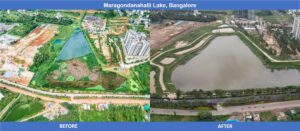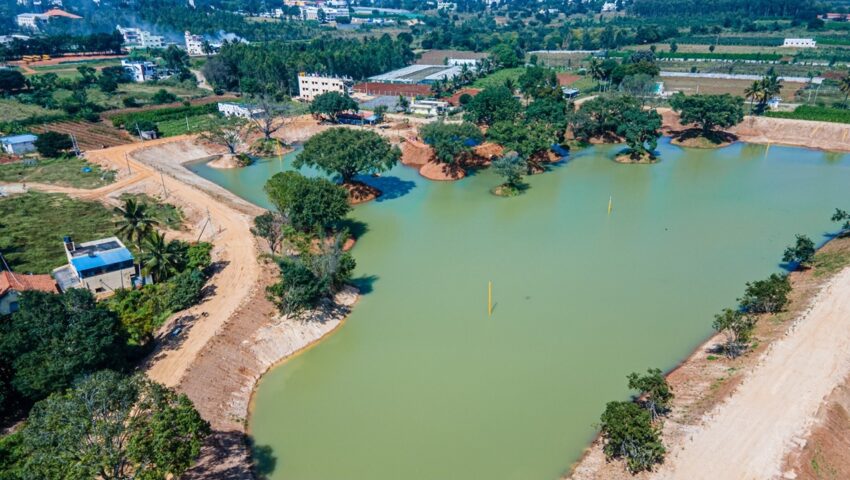N.B. Nair
A report by Niti Ayog in August 2019 painted a grim picture of water security in several cities of India. The report, came out after global concerns about the worsening water crisis in Cape Town, South Africa, with the city close to touching “Day Zero,” resulting in water rationing and civil strife in the city.
The national planning body had warned that India’s urban areas are likely to witness severe water shortages in the future, which could risk urban growth and reduce the quality of life for urban citizens.
The Cape Town crisis has “highlighted the risks and challenges that lie ahead for many Indian cities, including Bengaluru,” warned the Niti Ayog.
These predictions caused panic among people in those cities, which are likely to affect by the water crisis. Tens of thousands of people migrated to these cities in search of livelihood and invested their hard-earned resources there. But the prospects of water security in the near future rang alarm bells for them, as also planners and administrators.
This is when Anand Malligavad, an engineer by profession in Bengaluru decided to risk his job to rejuvenate the water bodies in the IT capital of India. Anand while working for a private automotive component manufacturer in the city decided to revitalise a 36-acre lake, which had dried up. His employer reluctantly agreed to support him with their Corporate Social Responsibility (CSR) funds to revive a lake close to his office. Anand’s persistent efforts bore positive results with support trickling in from different sources like company executives, nature conservationists, local bodies, and some voluntary organisations.
“I used to try and finish the office work early and work to clean up the lakes. With the support of CSR funds from my employer, I was able to rejuvenate Kyalasanahalli Lake in Bengaluru in just 45 days. Subsequently, several organisations came forward and I was able to take up other lake rejuvenation projects,” Anand told Inspirational India.
“My motivation to work on lakes was never monetary in nature, my decision to work solely on lakes was to provide benefits to thousands of people, keep up the flora and fauna, and ensure we have an abundance of rich wetlands in the country,” said Anand from the rural areas of Koppal district in north Karnataka.
Since the banks of these lakes were encroached upon by people, Anand had to face opposition from those illegal encroachers.
“In my first project, I was for the first-time encountering encroachers and was perplexed about how to get captured areas around the lake released. They were all the more worried about losing the land versus realising how much they would gain if the lakes come back to life. I did not relent and stood my ground more so as I had all government approvals and it was an official project and I had no personal interest in the land encroached. I had the support from the local MLA and his visit to the lake during the project only strengthened my mission and challenge the encroachers,” Anand said.

Besides, evicting illegal encroachers around the lakes, there were several other challenges for his mission – mobilising corporate funding, gaining the confidence of senior corporate management to support his efforts, building a knowledge base for the rejuvenation of water bodies, educating local communities to enlist their support and gain their confidence, getting approval and support from local leaders. “Each lake is different and requires different innovative ways to revive, keeping funds and timelines in mind,” said Anand.
Anand is a single-man army and does not have a full-time team to support him. But the success of the first two projects and the impact it created, made all the difference. Besides, the local media highlighted his work, which helped in building public support.
“Villagers had access to clean water, groundwater levels were recharged, canals around the lakes were also revived for farming and the landscaping around the lakes was a pleasing sight. With the revival of lakes and their green surroundings, the aquatic species in the lake increased and birds returned to the area, he added.
The ‘Lake Man’ began his mission in 2017 when he took up rejuvenation of one lake. In 2018, he took up another project and rejuvenation two lakes in 2019. By 2022, he was able to revive 17 more lakes across Bengaluru and places as far as Ayodhya, Odisha. So far, 29 lakes have been rejuvenated and 462 acres of land restored. “The rejuvenated water body will be able to self-sustain for years to come,” said the gratified missionary.
“I have now built a big network of people interested in nature conservation through my projects. With the growing support of local authorities, government, local communities, media, corporates and volunteers, and my working team, I have reset my earlier mission of rejuvenating 45 lakes by 2025 and now aiming to rejuvenated over 100+ lakes by 2025 not just in Bangalore but across India,” Anand outlined his future projects.
“There was a myth that rejuvenating a waterbody involves time and resources, but my passionate efforts have proved, it can be done in about 90 days with one-fourth of the cost compared to government spending,” said a confident Anand.
Anand’s pan India mission to rejuvenate lakes has given him the moniker of “Lakeman of India,” like ‘Waterman of India’ to the water conservationist from Rajasthan, Rajender Singh.
Image courtesy: Anand Malligavad

